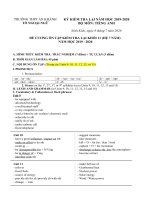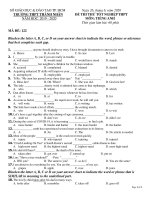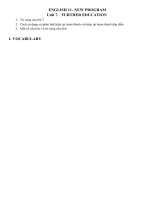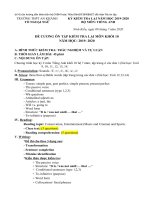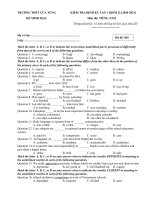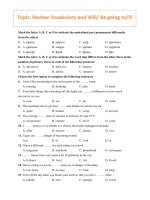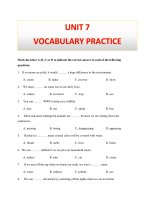- Trang chủ >>
- Đề thi >>
- Đề thi tuyển dụng
DE THPT QG
Bạn đang xem bản rút gọn của tài liệu. Xem và tải ngay bản đầy đủ của tài liệu tại đây (63.54 KB, 6 trang )
<span class='text_page_counter'>(1)</span>MR.BEAN’S MATERIALS. KỲ THI THỬ THPT QUỐC GIA – NĂM HOC 2016-2017 MÔN: TIẾNG ANH Thời gian làm bài : 90 phút. Họ tên thí sinh: ..................................................................... S ố báo danh: ............................. PHẦN TRẮC NGHIỆM: (8 điểm) Mark the letter A, B, C, or D on your answer sheet to indicate the word whose underlined part is pronounced differently from that of the rest in each of the following questions. Question 1: A. chorus B. duchess C. duke D. stomach Question 2: A. conserve B. amuse C. dissolve D. resident Mark the letter A, B, C or D on your answer sheet to indicate the word that differs from the other three in the position of the primary stress in each of the following question. Question 3: A. observant B. decisive C. popular D. impatient Question 4: A. reliable B. conventional C. preservative D. intellectual Question 5: A. customer B. energy C. computer D. property Mark the letter A, B, C, or D on your answer sheet to indicate the word(s) CLOSEST in meaning to the underlined word(s) in each of the following questions. Question 6 : Now many people who shop at a healthy food store instead of a local supermarket are much more likely to find a healthy, sugar-free beverage A. full of preservatives B. harmful to heath C. convenient to prepare D. beneficial to heath Question 7 : Even though the mountain was very steep and the climb was hazardous, several adventurous tourists managed to reach the top. A. Causing a lot of risks B. bringing excitement C. Resulting in depression D. costing a lot of money Question 8: Dozens of applicants showed up for the vacant position, but only a handful of them were shortlisted for the interview. A. class B. hand C. small number D. small amount Mark the letter A, B, C, or D on your answer sheet to indicate the word(s) OPPOSITE in meaning to the underlined word(s) in each of the following questions. Question 9: Mr. Brown is a very generous old man. He has given most of his wealth to a charity organization. A. hospitable B. honest C kind D. mean Question 10: In the first two decades of its existence, the cinema developed rapidly. A. leisurely B. sluggishly C. weakly D. shortly Mark the letter A, B, C, or D on your answer sheet to indicate the underlined part that needs correction in each of the following questions. Question 11: Our astronauts chosen for fly space craft were selected from military test pilots. A. chosen for fly B. space craft C. were D. pilots Question 12: After our discussion, we decided to take a late flight and so that we could spend more time with the clients. A. After our discussion B. a late flight C. and so that D. more time Question 13: These exercises look easy, but they are very relatively difficult for us. A. These exercises B. easy C. relatively D. for Question 14: As the old one, this new copier can perform its functions in half the time. A. As B. can perform C. half the time D. its functions in Question 15: The assumption that smoking has bad effects on our health have been proved. A. that B. effects C. on D. have been proved.
<span class='text_page_counter'>(2)</span> Mark the letter A, B, C or D on your answer sheet to indicate the correct answer to each of the following questions. Question 16: __________ was the tea that we couldn’t drink it. A. No longer B. So strong C. Hardly ever D. How strong Question 17: Do you remember__________ to help us when we were in difficulty? A. once offering B. to offer C. being offered D. you offer Question 18:We could have caught the last train, but we________ five minutes late. A. were B. have been C. would be D. are Question 19: __________ always gives me real pleasure. A. I arrange flowers B. The flowers are arranged C. While arranging flowers D. Arranging flowers Question 20: In our team, no person__________ John could finish this tough task in such a short time. A. other than B. including C. outside D. rather than Question 21: Tom hasn’t completed the work yet and Maria hasn’t__________. A. also B. either C. neither D. too Question 22: Kay: “I wouldn’t do that if I were you.” John: “_________________” A. Wouldn’t you? Why? B. Would you, really? C. I’d rather you didn’t. D. It’s out of the question. Question 23: In my apartment there are two rooms, ___________ is used as the living-room. A. the large one B. the largest one C. the largest of which D. the larger of which Question 24: We received a call from the teacher__________ charge of our course. A. to B. in C. at D. on Question 25: The superstar, accompanied by the other members of the band, __________ to visit our school next week. A. has had B. are C. is going D. are going Question 26: We hoped__________ they would come and give us new lectures. A. when B. that C. which D. what Question 27: Mrs. Chau has managed the department__________ that she’ll be promoted next month. A. too successful B. so successfully C. very successful D. too successfully Question 28: __________ he got top marks at high school, he never went to university. A. Despite B. Although C. Meanwhile D. Nevertheless Question 29: Sammy had worked in England for a year__________ moving to Scotland. A. until B. once C. while D. before Question 30: Lucy: “You look really nice in that red sweater!” Sue:“________________” A. Don’t mention it. B. How dare you? C. I’m afraid so. D. Thank you. th Question 31: Applications__________ in after 30 April will not be considered. A. sent B. that is sent C. which sent D. send Question 32: Mary: “The hat’s so beautiful. Thanks.” Tony: “_________________” A. Lucky you! B. Great idea! C. The same to you! D. I’m glad you like it. Question 33: “It’s about time you__________ your homework, Mary.” A. must do B. did C. do D. will do Question 34: The higher the content of carbon dioxide in the air is, __________. A. the more heat it retains B. the heat it retains more C. it retains the more heat D. more heat it retains Question 35: “Could you turn off the stove? The potatoes _________ for at least thirty minutes. A. boiled B. were boiling C. have been boiling D. are boiling Read the following passage and mark the letter A, B, C, or D on your answer sheet to indicate the correct answer to each of the questions..
<span class='text_page_counter'>(3)</span> A radio telescope is a radio receiver that “sees” radio waves. Unlike a normal telescope, which sees light, a radio telescope is used primarily in the area of astronomy because it can detect radio waves that are emitted by celestial objects. Such objects in space, also called radio objects, can be things such as hot gas, electrons, and wavelengths given off by different atoms and molecules. The first radio telescope was invented by Grote Reber in 1937. He was an American who graduated with a degree in engineering. He went on to work as an amateur radio operator and later decided to try to build his own radio telescope in his backyard. Reber’s first two radio receivers failed to pick up any signals from outer space, but in 1938, his third radio telescope successfully picked up radio waves from space. A radio telescope consists of a large parabolic-shaped dish antenna or a combination of two or more. The significance of the parabolic shape allows for the incoming radio waves to be concentrated on one focal point, allowing the signals to be picked up as strongly as possible. A larger dish means that more signals can be received and focalized. In the late 1950s and early 1960s, the largest radio telescope of the time was invented with a seventy-six-meter telescope although larger telescopes have been made since then. The largest current radio telescope in the world is the RATAN-600 in Russia, whose diameter is 576 meters. It has provided valuable feedback of the sun’s radio wavelengths and atmosphere. The largest radio telescope in Europe is a 100-meter diameter telescope in Germany, and the largest radio telescope in the United States is the Big Ear in the state of Ohio. The largest array of telescopes is the Giant Metre wave Radio Telescope in India. Radio telescopes have provided scientists with valuable information about our universe. One of the most important functions of radio telescopes is their ability to allow scientists to track different space probes, the unmanned space missions in outer space. Radio telescopes allow for the travel of space probes into places like the surface of Mars that are too dangerous for men to explore. Without radio wave technology, scientists would not know much of what inhabits the universe nor would they be able to see it. Radio waves are our eyes and ears in outer space. (By Timothy Hall, Arthur H. Milch and Denise Mc Cormach. How to Master skills for the TOEFL iBT) Question 36: According to the passage, a radio telescope enables the detection of___________. A. shapes and sizes of celestial objects B. normal light of celestial objects C. creatures that inhabit celestial objects D. radio waves sent out by celestial objects Question 37: According to paragraphs 2, all of the following are true about Grote Reber EXCEPT that___________. A. he was an inventor B. he was an engineer C. he was an astronomer D. he was an amateur radio operator Question 38: The verb “pick up” in paragraph 3 is closest in meaning to___________. A. select B. send C. receive D. lift Question 39:According to the passage, which of the following statements is TRUE? A. The Big Ear in the United States produces the largest array of telescope B. A larger dish antenna helps a radio telescope produce better results. C. The largest radio telescope of all time is the one with a seventy-six-meter diameter. D. The pattern of radio waves received by radio telescopes is significant. Question 40: The word “current” in paragraph 4 is closest in meaning to___________. A. moving B. water movement C. electricity flow D. existing Question 41: The word “they” in paragraph 5 refers to___________. A. scientists B. radio waves C. places D. eyes and ears Question 42: Radio waves are scientists’ eyes and ears in outer space because___________. A. they can help them understand more about the universe B. they can recognize who dominates the universe C. they allow them to travel to such dangerous places as Mars D. they help to track only manned space missions in space Question 43: The focus of discussion in the passage is___________. A. radio telescope B. Atoms and molecules.
<span class='text_page_counter'>(4)</span> C. radio waves D. radio operations Question 44: Originally, this passage was probably published in_____________. A. a business journal B. a scientific journal C. a fashion magazine D. a book on environment Question 45: Grote Reber’s idea to develop a radio telescope was not successful until___________. A. he first built one in his backyard B. he experimented on the third one C. he picked up signals from outer space D. he graduated from an engineering school Read the following passage and mark the letter A, B, C, or D on your answer sheet to indicate the correct word for each of the blanks. Set in the red desert of central Australia is the mining town of Coober Pedy. At first sight, the town looks similar to many other such communities, but Coober Pedy is different. Sixty per cent of its population of some 4,000 people live underground. There are today about 800 underground houses as well as shops, hotels and even churches in the town and the (46)___________ hills. Once a site has been chosen, special tunneling machines are (47)___________ in to create passages and rooms in the sandstone. Rock pillars are left to (48)___________ the roof, and doors and windows are cut into the front. Houses are of all shapes and (49)___________, the largest having twenty rooms, and some even have their own swimming poll. Living underground may sound strange but in fact it has a number of advantages. In summer, the temperature outside can reach an astonishing 47oC, and in winter the nights can be (50)___________ cold. However, inside the houses it remains a steady 25oC all year (51)___________. Many people say that living underground makes them feel very secure. There is no problem with noise from the neighbours and the houses are not (52)___________. By the fierce dust storms that regularly (53)___________ through the area. And of course, if your family (54)___________ or lots of friends come to stay, you can always dig another room. Question 46: A. near Question 47: A. brought Question 48: A. lift Question 49: A. sizes Question 50: A. strongly Question 51: A. along Question 52: A. spoiled Question 53: A. pour Question 54: A. grows. B. enclosing B. entered B. support B. areas B. heavily B. round B. disturbed B. sweep B. rises. C. close C. placed C. push C. volumes C. extremely C. across C. unfluenced C. flood C. stretches. D. surrounding D. worked D. rise D. numbers D. sharply D. wide D. affected D. hurry D. explodes. Read the following passage and mark the letter A, B, C, or D on your answer sheet to indicate the correct answer to each of the questions. Bringing up children Where one stage of child development has been left out, or not sufficiently experienced, the child may have to go back and capture the experience of it. A good home makes this possible - for example, by providing the opportunity for the child to play with a clockwork car or toy railway train up to any age if he still needs to do so. This principle, in fact, underlies all psychological treatment of children in difficulties with their development, and is the basic of work in child clinics. The beginnings of discipline are in the nursery. Even the youngest baby is taught by gradual stages to wait for food, to sleep and wake at regular intervals and so on. If the child feels the world around him is a warm and friendly one, he slowly accepts its rhythm and accustoms himself to conforming to its demands. Learning to wait for things, particularly for food, is a very important element in upbringing, and is achieved successfully only if too great demands are not made before the child can understand them. Every parent watches eagerly the child's acquisition of each new skill: the first spoken words, the first independent steps, or the beginning of reading and writing. It is often tempting to hurry the child beyond his natural learning rate, but this can set up dangerous feelings of failure and states of anxiety in the child. This might happen at any stage. A baby might be forced to use.
<span class='text_page_counter'>(5)</span> a toilet too early, a young child might be encouraged to learn to read before he knows the meaning of the words he reads. On the other hand, though, if a child is left alone too much, or without any learning opportunities, he loses his natural zest for life and his desire to find out new things for himself. Learning together is a fruitful source of relationship between children and parents. By playing together, parents learn more about their children and children learn more from their parents. Toys and games which both parents and children can share are an important means of achieving this cooperation. Building-block toys, jigsaw puzzles and crosswords are good examples. Parents vary greatly in their degree of strictness or indulgence towards their children. Some may be especially strict in money matters; others are severe over times of coming home at night, punctuality for meals or personal cleanliness. In general, the controls imposed represent the needs of the parents and the values of the community as much as the child's own happiness and well-being. With regard to the development of moral standards in the growing child, consistency is very important in parental teaching. To forbid a thing one day and excuse it the next is no foundation for morality. Also, parents should realize that “example is better than precept”. If they are hypocritical and do not practise what they preach, their children may grow confused and emotionally insecure when they grow old enough to think for themselves, and realize they have been, to some extent, deceived. A sudden awareness of a marked difference between their parents' ethics and their morals can be a dangerous disillusion. Questions 55. The principle underlying all treatment of developmental difficulties in children________. A. is in the provision of clockwork toys and trains B. is to send them to clinics C. is to capture them before they are sufficiently experienced D. offers recapture of earlier experiences Questions 56. Learning to wait for things is successfully taught___________. A. in spite of excessive demands being made B. only if excessive demands are avoided C. because excessive demands are not advisable D. is achieved successfully by all children Questions 57: The encouragement of children to achieve new skills__________. A. should be focused on only at school B. can never be taken too far C. will always assist their development D. should be balanced and moderate Questions 58: Parental controls and discipline__________. A. serve a dual purpose B. are designed to promote the child’s happiness C. reflect only the values of the community D. should be avoided as far as possible Questions 59: The practice of the rule “example is better than precept”__________. A. only works when the children grow old enough to think for themselves B. would help avoid the necessity for ethics and morals C. will free a child from disillusion when he grows up D. is too difficult for all parents to exercise Questions 60: In the 1st paragraph, the author lays some emphasis on the role of the_________ in helping the child in trouble. A. psychiatrists B. community C. family D. nursery Questions 61: The phrase ‘conforming to’ in the 2nd paragraph means__________. A. adapting to B. accepting C. agreeing with D. following Questions 62: The word ‘zest’ in the 2nd paragraph can be best replaced by__________. A. appetite B. excitement C. enthusiasm D. enjoyment Questions 63: The word ‘imposed’ in the 4th paragraph is closest in meaning to__________. A. excepted B. introduced C. made D. constrained Questions 64: Hypocrisy on the part of the parents may__________. A. result in their children’s wrong behaviour B. make their children lose faith in them C. disqualify their teachings altogether D. impair their children’s mind PHẦN TỰ LUẬN: (2 điểm).
<span class='text_page_counter'>(6)</span> I. Rewrite each of the following sentences in such a way that the original meaning is exactly the same as the provided one. Question 1: The keepers feed the lions at 3 pm every day. The lions are fed once a day by the keepers. Question 2: We got lost because we didn't have a map. If we had had a map, we wouldn’t have got lost. Question 3: I would prefer you to deliver the sofa on Friday. I would rather you delivered the sofa on Friday. Question 4: The bridge was so low that the bus couldn't go under it. It was such a low bridge that the bus couldn’t go under it. Question 5: That was a silly thing to say. What a silly thing to say. II. Topic: Airlines have changed the ways we travel. Do you think so? An airplane is a form of transportation that has changed people's lives. Thanks to the plane, our lives are now faster, more exciting, and more convenient that before. You cannot deny that a plane is fast. For example, the Concorde flies at supersonic speed. A businessman can leave Paris at 11 a.m. in the morning and arrive in New York at 8 a.m. the same morning in time for a day's work. Many business people in Europe will fly to London for a noon meeting and then return home to Rome or Madrid for dinner. It is always exciting to take a plane trip. When you take a trip by plane, you know that you might cross many time zones, many oceans, and many countries. When you get off the plane, you could be in a place that speaks a different language. A plane is like a magician's trick. You get in a box and you come out somewhere totally different. Nothing can beat the convenience of a plane. In the old days, it might take you days to do what the plane can do it an hour. Boats, for example, only leave on certain days of the week and take a long time to get to their destination. Planes give you the option to leave several times a day and get you to your destination quickly. Although other forms of transportation may be more comfortable, none has changed the way we do business and live our lives more than the plane. Thanks to the speed, excitement, and convenience of the planes, our lives are richer. -----------------THE END-----------------.
<span class='text_page_counter'>(7)</span>



